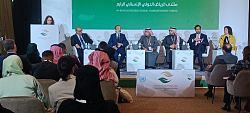
Emergency Relief Convoy from KSrelief Arrives in Marib
An emergency relief convoy provided by the King Salman Humanitarian Aid and Relief Center (KSrelief) arrived in Marib Governorate on Sunday, as part of efforts to address the growing humanitarian needs of displaced families in the governorate.

Massive 7.0 Magnitude Earthquake Strikes Alaska, USA
A powerful 7.0 magnitude earthquake struck Alaska, USA, yesterday evening, according to the United States Geological Survey (USGS).

Japan's LNG imports down 1.4 percent
Japan's liquefied natural gas (LNG) imports fell 1.4 percent to 64.98 million tons last year 2025, compared to 2024. according to provisional data released by the Japanese Ministry of Finance today, Thursday.

Paris Saint-Germain temporarily tops the French league after their win against Auxerre
Paris Saint-Germain defeated Auxerre 1-0 in their Ligue 1 match on Matchday 19.
Last Update: ،
2026/01/25
Time
06:20:06
Latest News:
 Prime Minister receives Italian Ambassador
Prime Minister receives Italian Ambassador
 Presidential Leadership Council Member al-Subaihi confers with U.S. Ambassador over partnership in fighting ..
Presidential Leadership Council Member al-Subaihi confers with U.S. Ambassador over partnership in fighting ..
 President al-Alimi Congratulates on Australia National Day
President al-Alimi Congratulates on Australia National Day
 Arab Parliament reiterates its support for Yemen's unity, sovereignty, territorial integrity
Arab Parliament reiterates its support for Yemen's unity, sovereignty, territorial integrity
 First Batch of Petroleum Derivatives Grant to Socotra Governorate Arrived
First Batch of Petroleum Derivatives Grant to Socotra Governorate Arrived
Latest News:
 Prime Minister receives Italian Ambassador
Prime Minister receives Italian Ambassador
 Presidential Leadership Council Member al-Subaihi confers with U.S. Ambassador over partnership in fighting ..
Presidential Leadership Council Member al-Subaihi confers with U.S. Ambassador over partnership in fighting ..
 President al-Alimi Congratulates on Australia National Day
President al-Alimi Congratulates on Australia National Day
 Arab Parliament reiterates its support for Yemen's unity, sovereignty, territorial integrity
Arab Parliament reiterates its support for Yemen's unity, sovereignty, territorial integrity
 First Batch of Petroleum Derivatives Grant to Socotra Governorate Arrived
First Batch of Petroleum Derivatives Grant to Socotra Governorate Arrived
Minister Badhib emphasizes importance of strengthening coordination with partners
[25/02/2025 05:31]
RIYADH – SABA
Minister of Planning and International Cooperation Dr. Waed Badhib has emphasized the importance of enhancing close coordination with regional and international partners with the Yemeni government, represented by the Ministry of Planning.
This coordination aims to align donor interventions with national priorities.
This statement was made during a dialogue session held Tuesday as part of the activities of the Fourth Riyadh International Humanitarian Forum, focusing on cooperation and developmental integration, as well as the mechanisms for collaboration between donor countries, international and local organizations and the Yemeni government.
The session aimed to highlight the efforts made and showcase the scale of contributions from donor countries and international and local organizations in cooperation with the legitimate government and international partners to achieve the desired goals.
It also discussed the challenges faced by donors and partners in implementing projects and overcoming these challenges while enhancing cooperation between donor countries, international and local organizations and the Yemeni government to achieve sustainable development goals.
Minister Badhib praised the efforts and support of the Saudi Program for Development and Reconstruction of Yemen, the King Salman Humanitarian Aid and Relief Center, the UN Resident Coordinator for Humanitarian Affairs in Yemen and all partners for Yemen on various fronts.
He pointed to the challenges Yemen faces in its economic, social, humanitarian, and institutional dimensions due to the war ignited by the Houthi terrorist militias, which has led to a loss of more than half of Yemen's national income, amounting to approximately $250 billion, a depreciation of the national currency by about 700%, and a cumulative inflation rate reaching 183%, with unemployment rising to 80%.
The Minister of Planning and International Cooperation noted that international and regional support for the country has taken two paths: humanitarian and developmental interventions together.
He addressed the government's priorities in achieving development and resilience through a short-term plan aimed at halting the deterioration of the economic situation, establishing the foundations of economic development, enhancing governance, and strengthening the private sector's resilience.
Badhib reviewed the medium-term priorities focused on the gains to be achieved from implementing urgent priorities that require coordinated efforts with stakeholders, especially from the government side, the private sector, civil society, and international partners.
These priorities include achieving economic recovery, financial and administrative reform, increasing economic growth rates, improving human development and sustainable development indicators, and raising the average income per capita.
Minister Badhib highlighted the role of Yemen's partners in supporting institutional reform of the government and aligning their interventions with national development plans to achieve a significant impact.
Key words:
SABA Minister - Reconstruction - administrative - contributions - approximately - collaboration - International - developmental - deterioration - organizations - Emergency Relief Convoy from KSrelief Arrives in Marib
Emergency Relief Convoy from KSrelief Arrives in Marib Prime Minister receives Italian Ambassador
Prime Minister receives Italian Ambassador Presidential Leadership Council Member al-Subaihi confers with U.S. Ambassador over partnership in fighting terrorism
Presidential Leadership Council Member al-Subaihi confers with U.S. Ambassador over partnership in fighting terrorism President al-Alimi Congratulates on Australia National Day
President al-Alimi Congratulates on Australia National Day Arab Parliament reiterates its support for Yemen's unity, sovereignty, territorial integrity
Arab Parliament reiterates its support for Yemen's unity, sovereignty, territorial integrity  First Batch of Petroleum Derivatives Grant to Socotra Governorate Arrived
First Batch of Petroleum Derivatives Grant to Socotra Governorate Arrived  Ministry of Electricity: Emirati Company Suddenly Shut Down Solar Power Plants in Aden, Shabwa
Ministry of Electricity: Emirati Company Suddenly Shut Down Solar Power Plants in Aden, Shabwa Yemen’s Ambassador Discusses Issues of Mutual Interest with Cuba’s Deputy Minister of Foreign Affairs
Yemen’s Ambassador Discusses Issues of Mutual Interest with Cuba’s Deputy Minister of Foreign Affairs Deputy Chief of Staff Discusses ICRC's Medical, Humanitarian Interventions in Yemen
Deputy Chief of Staff Discusses ICRC's Medical, Humanitarian Interventions in Yemen China reaffirms its commitment to supporting peace efforts in Yemen
China reaffirms its commitment to supporting peace efforts in Yemen 


